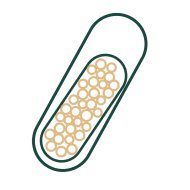A shortage of vitamin B9 is sometimes seen in cases of alcoholism, Crohn's disease (chronic disease of the intestines) or coeliac disease, or while taking certain medications (anti-infective or cancer drugs). It causes symptoms such as muscle cramps, fatigue, headaches and anaemia. There are drug
interactions with folates, so they should only be taken following medical advice.
The contraceptive pill depletes folic acid. Women wanting to get pregnant are therefore recommended to stop taking their contraception at least six months before conception and to take a folic acid supplement to guarantee a sufficient quantity in the initial stages of foetal development.
The daily recommended dose for women is 300 µg of folates.
It is recommended that pregnant women take a supplement of 400 µg of folates/day. Women of reproductive age wanting to get pregnant are also advised to take a folic acid supplement (400 µg of folates/day) at least four weeks before conception and up
to eight weeks afterwards. This is to prevent a folate deficiency that may cause deformities in the nervous system of the foetus (spina bifida - a defect in the closure of the spine - or a lack of brain development). Vitamin B9 has no side effects at the usual doses. The concomitant consumption of green tea may reduce its activity.
Good for
Production of genetic material, pregnancy, breast-feeding


